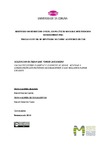Voces das últimas que foron quedando, un diálogo sobre o hábitat e o dereito ao rural: achegas á cosmovisión das indíxenas nicaragüenses e das mulleres rurais galegas
Title
Voces das últimas que foron quedando, un diálogo sobre o hábitat e o dereito ao rural: achegas á cosmovisión das indíxenas nicaragüenses e das mulleres rurais galegasAuthor(s)
Directors
Serantes-Pazos, AraceliDate
2018Center/Dept./Entity
Universidade da Coruña. Facultade de SocioloxíaDescription
Traballo fin de mestrado (UDC.SOC). Políticas sociais e intervención sociocomunitaria. Curso 2017/2018Abstract
[Resumo] Está previsto que no 2050 a taxa de urbanización do mundo chegue ao 65%; nas directrices internacionais sobre o hábitat invítase aos gobernos a lexislar nas cidades en favor de “densidades demográficas sostibles”. Mentres o rural, defínese como todo aquilo que non é urbano e, entendido como contorna, queda reducido a ser un lugar de produción para abastecer estas urbes. Á vez, dende elas, reclámase o espazo para a cidadanía, reivindícase o dereito á cidade, a unha cidade construída dende as habitantes do lugar. Baixo este paraugas de realidades diversas nace este Traballo de Fin de Mestrado. O seu obxectivo é proporcionar achegas ao coñecemento do hábitat rural dende a cosmovisión das mulleres indíxenas nicaragüenses e das mulleres rurais galegas.
Para levar a cabo esta aproximación partimos dunha metodoloxía cualitativa con características etnográficas, como son os mapeamentos colectivos ou sociais. Estes permitíronnos identificar as problemáticas dos rurais de Santa Rosa e Valdín – os dous lugares de referencia para este estudo -. A partir deles e dos datos recollidos, complementados con achegas de entrevistas a informantes chave, creamos un diálogo entre ambas cosmovisións mediante a triangulación de datos. Finalmente este diálogo serve para facer unha primeira achega ao dereito ao rural como unha proposta para un futuro sostible no que o que estea no centro sexa a vida e non o capital. [Abstract] It is predicted that in 2050 the level of global urbanization will reach 65%; in the international guidelines on habitat, governments are invited to legislate that cities adopt “sustainable density demographics.” Meanwhile in rural áreas, defined as everything that is not urban, understood as the what surrounds cities, is reduced to a place of production to supply the cities. At the same time, the countryside reclaims the space for its citizens, re-justifying their rights to the cities, to cities made up of local inhabitants. This Master’s Project is born under this umbrella of diverse realities. Its objective is to provide an approach to understanding the worldview of indigenous Nicaraguan women and rural Galician women of their rural habitat.
To carry out this approach, we based the study on a qualitative methodology with ethnographic characteristics, consistent with collective and social mapping. This allowed us to identify the issues of rural Santa Rosa and Valdin-- the two places referenced for this study-- to create a dialogue between both worldviews by means of triangulation of data-- data collected from, and augmented with, contributions from interviews with key informants. In order to, starting from this dialogue, finally create the first definition of the right to the rural space as a proposition for a sustainable future in which life is central, not capital.
Keywords
Rural
Cidade
Dereito á cidade
Dereito ao rural
Identidade
Feminismos
City
Right to the city
Right to the rural
Identity
Feminisms
Cidade
Dereito á cidade
Dereito ao rural
Identidade
Feminismos
City
Right to the city
Right to the rural
Identity
Feminisms
Rights
Atribución 3.0 España







